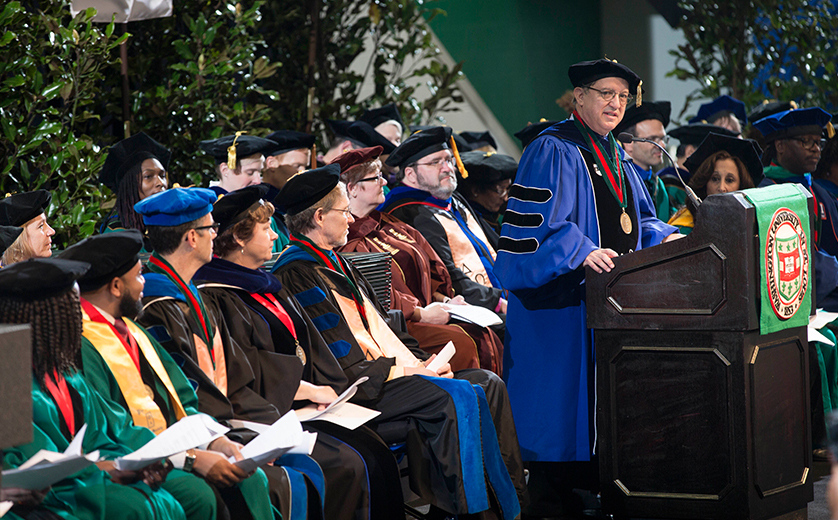Nearly 300 degree candidates were honored at the Brown School Recognition Ceremony at the Washington University Field House, May 19. The ceremony was the last as Dean of the Brown School for Edward F. Lawlor, who will conclude his deanship on June 30. Of the 88 commencement ceremonies he has been a part of during his life and time as dean, this one, he remarked, would be one he remembered most.
Dean Lawlor encouraged graduates to fully take on their roles as change-makers.
“I would argue it is our professional and moral responsibility—all of us, faculty, staff, graduates here tonight—to be activists,” Dean Lawlor said. “Your charge, as old as the fields of public health and social work, is to affect the systems that create injustice, disparities or disadvantage.”
“Systemic change is why we are all here,” he said. “With all of your talent, you could make more money elsewhere, and you certainly could pick an easier life and career path. But you now have your Brown School degree, and we are counting on you to be our force for good.”
Dean Lawlor gave each graduate a locally produced pin with the word activist, to remind the graduates of their impactful role.
In addition to the doctoral candidates and Master of Social Work and Master of Public Health students, this year’s ceremony also recognized the Brown School’s first cohort of Master of Social Policy students from China. The six students are part of a growing dual-degree Master of Social Policy/Master of Arts program with Fudan University, which emphasizes a global perspective on social policy and leadership.
Rabbi Susan Talve of Central Reform Congregation in St. Louis, who has been a prominent community activist and a strong voice in the Black Lives Matter movement, gave the invited remarks at the ceremony.
Her words recalled the summer of 2014—the summer that many of this year’s master’s candidates moved to St. Louis to begin their graduate degrees—and the unrest and demonstrations that followed the shooting death of Michael Brown in Ferguson, Mo.
“Be a witness to this moment in history,” Rabbi Talve told the graduates, “when we must infuse into everything that we do that black and brown lives matter.”
Her message to the students: to be present, to listen, to work together with the people they serve, to use their privilege and knowledge to heal.
“We will keep marching and keep shaking things up, trusting that you are using your social work, public health and social policy tool box to build a safer and more just society,” she said, “until there is one Ferguson, one St. Louis, and one America. And dare we hope for one world, where we use the tools of your education to resist and transform the structures of racism and oppression wherever they exist.”
“Using your tool boxes, not for your personal gain, but for the common good, you are the revolution,” she said. “You are the change that we need to heal and to grow hope.”
